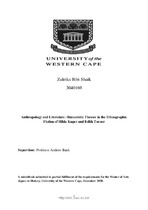| dc.contributor.advisor | Bank, Andrew | |
| dc.contributor.author | Shaik, Zuleika Bibi | |
| dc.date.accessioned | 2021-04-09T08:42:39Z | |
| dc.date.available | 2021-04-09T08:42:39Z | |
| dc.date.issued | 2020 | |
| dc.identifier.uri | http://hdl.handle.net/11394/8176 | |
| dc.description | Magister Artium - MA | en_US |
| dc.description.abstract | This mini-thesis makes an argument for the significance of a female-dominated hidden tradition of experimental ethnographic writing in British social anthropology. It argues that the women anthropologists who experimented with creative forms of ethnography were doubly marginalised: first as women in an androcentric male canon in British social anthropology and American cultural anthropology, and second as creative writers whose work has been consistently undervalued in sombre scholarly circles. The study proposes that Hilda Beemer Kuper (1911-1995) and Edith Turner (1921-2016) should be regarded as significant in a still unexcavated literary tradition or subgenre with Anglo-American anthropology. | en_US |
| dc.language.iso | en | en_US |
| dc.publisher | University of Western Cape | en_US |
| dc.subject | Humanistic themes | en_US |
| dc.subject | Female-dominated tradition | en_US |
| dc.subject | Swazi co-wives | en_US |
| dc.subject | Humanist cross-cultural engagement | en_US |
| dc.title | Anthropology and literature: Humanistic themes in the ethnographic fiction of Hilda Luper and Edith Turner | en_US |
| dc.rights.holder | University of Western Cape | en_US |

